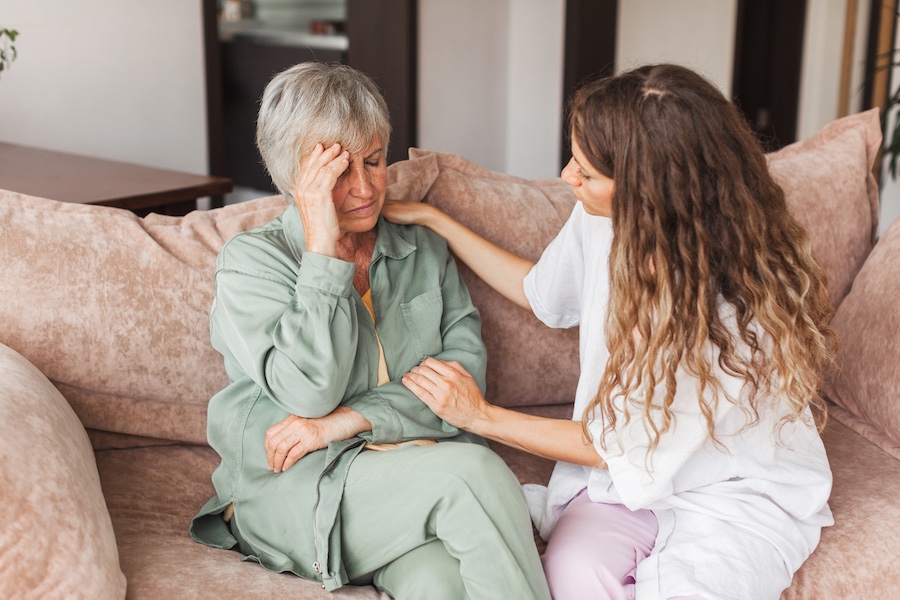
In just a few weeks, we’ll be setting our clocks back and experiencing shorter days and longer nights. While there is certainly plenty to look forward to in these fall and winter seasons—like comfy sweaters, warm fireplaces and pumpkin pie—we also need to be aware of the dangers that daylight saving time poses to older adults living with memory loss. While you may not have heard of sundown syndrome before, it’s a condition that affects many seniors. Here’s what you need to know about sundown syndrome and what you can do to help your loved one during these colder, darker months.
What is sundown syndrome?
Sundown syndrome, or sundowning, is a state of confusion, disorientation or even aggression exhibited by seniors living with memory loss. It typically occurs in fall and winter, when days get shorter and daylight is scarce. People with memory loss often follow a set routine—they might wake up, eat meals, do activities and go to bed at the same time every day—but when the days begin to change, their internal clock gets disrupted. For example, a senior may be used to eating dinner when the sun is still up, but if it’s suddenly dark outside during dinnertime, they may feel disoriented about where they are, what time it is, or even what is real versus what they’re imagining.
Although sundowning symptoms may be less intense when it is light outside, they can happen at any time of day. Other common symptoms of this condition include pacing and wandering, having trouble sleeping and paranoia. While you can’t cure sundown syndrome, there are a few things you can do to ease your loved one’s agitation.
What you can do to help
1. Talk to a doctor.
Sundowning sometimes looks similar to other medical issues, like having an adverse reaction to a new medication. Sundowning can also be made worse by underlying health problems such as a urinary tract infection. Talk to a doctor to ensure you know what you’re dealing with and confirm there aren’t any underlying causes aside from memory loss.
2. Stick to a routine.
You may think that adjusting your loved one’s routine to incorporate more daylight will ease their symptoms—for example, you might make dinnertime earlier while the sun is still up. However, changing routines will likely agitate even more. Instead, set a routine and try to maintain as much consistency as possible.
3. Let there be light.
Dim lighting indoors can further your loved one’s confusion about what time it is. Make sure their living space is brightly lit during the day, and when it’s time for bed, place a night light in their bedroom to ease any anxiety if they wake up in the middle of the night.
4. Help them get good sleep.
Ample rest can help reduce sundowning behaviors. Limit their sugar intake, don’t serve caffeine late in the day and turn off the TV and other screens well before bedtime. You might even play soothing music and upgrade their bedding. Think about what you do to help yourself get better sleep—and do the same for them.
5. Make sure they’re safe.
A common behavior of those with sundown syndrome is pacing and wandering. Help your loved one get the care they need as well as a reliable security system in case they attempt to leave their home alone at night. You might even consider using new caregiving technology to track where they are at night.
If you’re concerned about the safety of a senior with memory loss, consider our memory care apartments at Jackson Creek Senior Living. We focus on wellness, not illness, and our all-inclusive memory care apartments are fitted with wander alert security to help ensure the safety of your loved one. Visit us online or schedule a tour to learn more.



